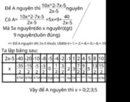NM
1

TT
Trịnh Thị Thanh Thuỷ
25 tháng 4 2021
Bài giải đây nha, có thể trình bày theo ý bạn

Đúng(0)